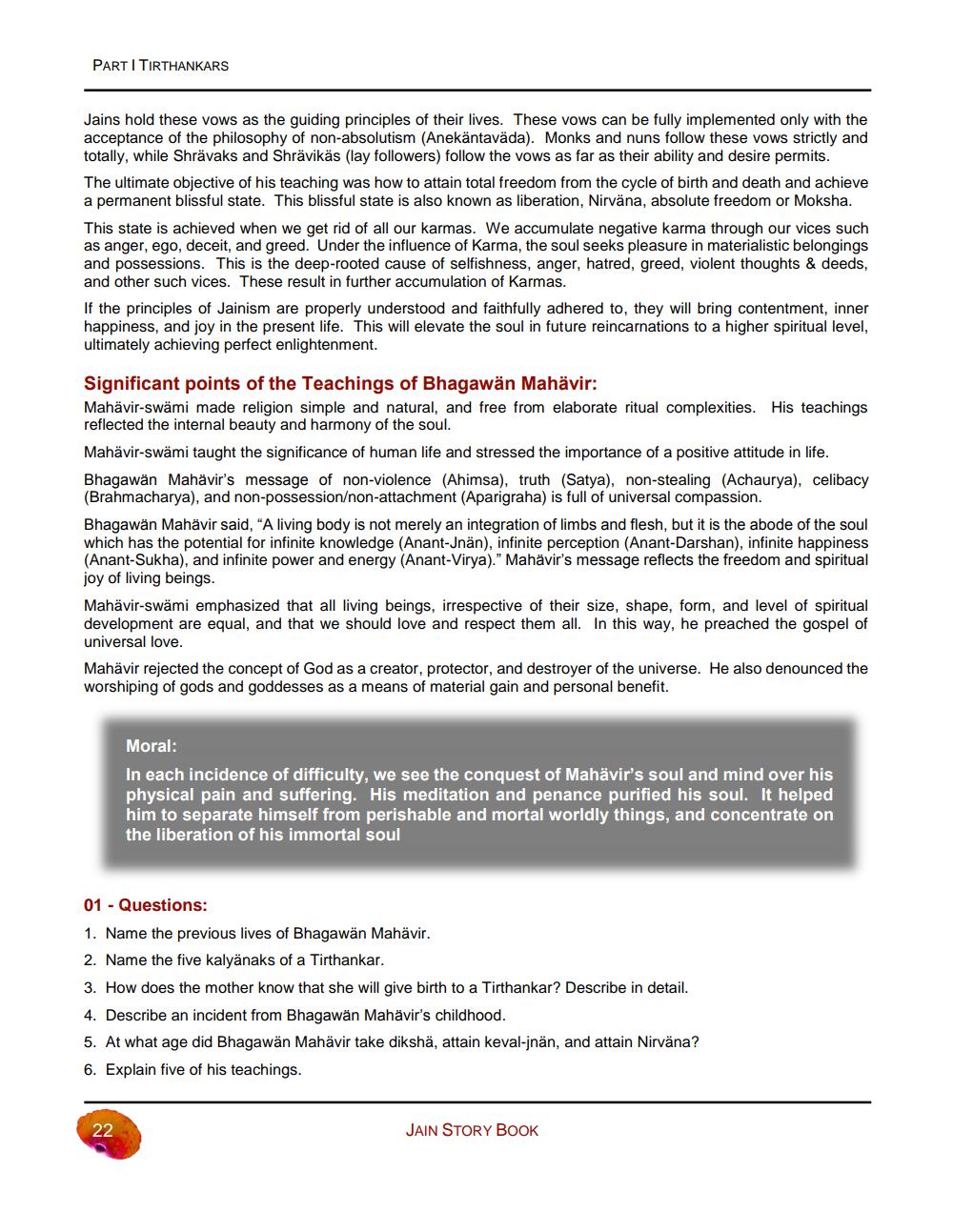________________
PART I TIRTHANKARS
Jains hold these vows as the guiding principles of their lives. These vows can be fully implemented only with the acceptance of the philosophy of non-absolutism (Anekäntaväda). Monks and nuns follow these vows strictly and totally, while Shrävaks and Shrävikäs (lay followers) follow the vows as far as their ability and desire permits. The ultimate objective of his teaching was how to attain total freedom from the cycle of birth and death and achieve a permanent blissful state. This blissful state is also known as liberation, Nirväna, absolute freedom or Moksha. This state is achieved when we get rid of all our karmas. We accumulate negative karma through our vices such as anger, ego, deceit, and greed. Under the influence of Karma, the soul seeks pleasure in materialistic belongings and possessions. This is the deep-rooted cause of selfishness, anger, hatred, greed, violent thoughts & deeds, and other such vices. These result in further accumulation of Karmas.
If the principles of Jainism are properly understood and faithfully adhered to, they will bring contentment, inner happiness, and joy in the present life. This will elevate the soul in future reincarnations to a higher spiritual level, ultimately achieving perfect enlightenment.
Significant points of the Teachings of Bhagawan Mahavir:
Mahävir-swämi made religion simple and natural, and free from elaborate ritual complexities. His teachings reflected the internal beauty and harmony of the soul.
Mahävir-swämi taught the significance of human life and stressed the importance of a positive attitude in life.
Bhagawan Mahavir's message of non-violence (Ahimsa), truth (Satya), non-stealing (Achaurya), celibacy (Brahmacharya), and non-possession/non-attachment (Aparigraha) is full of universal compassion.
Bhagawan Mahavir said, "A living body is not merely an integration of limbs and flesh, but it is the abode of the soul which has the potential for infinite knowledge (Anant-Jnän), infinite perception (Anant-Darshan), infinite happiness (Anant-Sukha), and infinite power and energy (Anant-Virya)." Mahävir's message reflects the freedom and spiritual joy of living beings.
Mahävir-swämi emphasized that all living beings, irrespective of their size, shape, form, and level of spiritual development are equal, and that we should love and respect them all. In this way, he preached the gospel of universal love.
Mahävir rejected the concept of God as a creator, protector, and destroyer of the universe. He also denounced the worshiping of gods and goddesses as a means of material gain and personal benefit.
Moral:
In each incidence of difficulty, we see the conquest of Mahävir's soul and mind over his physical pain and suffering. His meditation and penance purified his soul. It helped him to separate himself from perishable and mortal worldly things, and concentrate on the liberation of his immortal soul
01 - Questions:
1. Name the previous lives of Bhagawän Mahävir.
2. Name the five kalyänaks of a Tirthankar.
3. How does the mother know that she will give birth to a Tirthankar? Describe in detail.
4. Describe an incident from Bhagawan Mahavir's childhood.
5. At what age did Bhagawan Mahavir take dikshä, attain keval-jnän, and attain Nirväna? 6. Explain five of his teachings.
22
JAIN STORY BOOK




